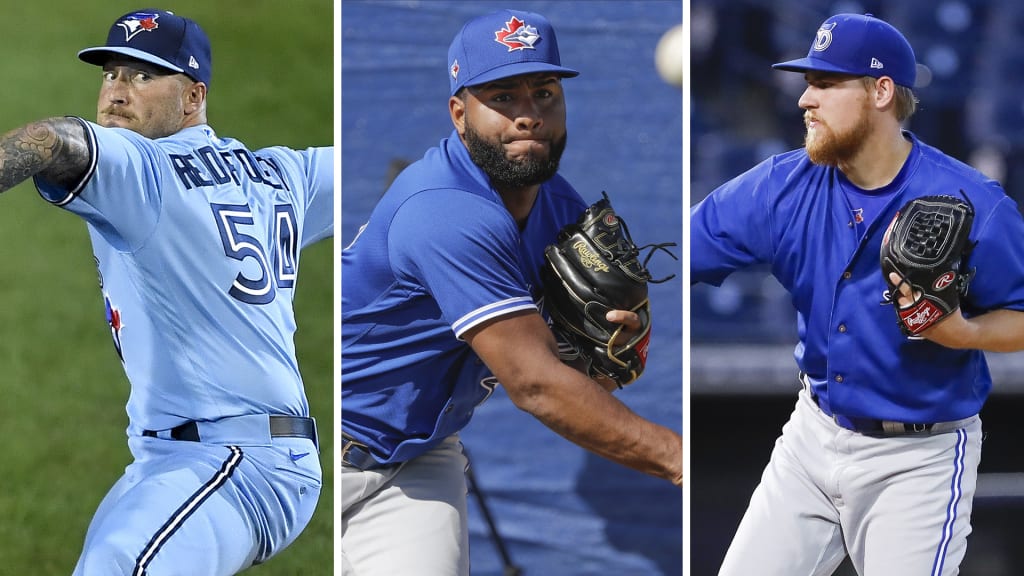
NEW YORK -- Steven Matz came to the Mets amid significant fanfare in 2015, a local product who made an immediate impact on a National League pennant-winning team. The left-hander eventually became one of the franchise’s longest-tenured players, with nearly six seasons in the organization.
That run came to an end Wednesday, when the Mets traded Matz to the Blue Jays for a trio of right-handers -- Sean Reid-Foley, Yennsy Diaz and Josh Winckowski. The move gives New York significant relief on Matz’s $5.2 million salary, which it can now use for other pursuits.
Mets get: RHPs Sean Reid-Foley, Yennsy Diaz and Josh Winckowski
Blue Jays get: LHP Steven Matz
The Mets remain in talks to acquire a starting center fielder, with Jackie Bradley Jr. an obvious candidate, as well as a starting pitcher. The team has been engaged with top free agent Trevor Bauer, who is reportedly seeking a record average annual value on his contract.
Trading Matz does not necessarily guarantee New York will sign Bradley or Bauer. But it does ensure it can pursue one, or both, with less risk of bumping against Major League Baseball’s $210 million luxury-tax threshold -- a “significant demarcation,” according to team president Sandy Alderson. After dealing Matz, the team has around $175 million in luxury-tax commitments for 2021.
Matz was a non-tender candidate in November due to his salary, but the Mets instead settled with him on a $5.2 million contract to avoid arbitration. Team officials said they intended to keep Matz stretched out as a starter, envisioning him as a depth piece behind Jacob deGrom, Carlos Carrasco, Marcus Stroman, David Peterson and Joey Lucchesi. But that opportunity was no guarantee of success. Matz struggled throughout the 2020 season, posting a 9.68 ERA in nine games and missing time due to left shoulder fatigue. He lost his grip on a rotation spot because of it.
The down season came after Matz established some long-awaited consistency in 2018 and '19, going 16-21 with a 4.09 ERA and a near-MLB-average 96 ERA+ over those two seasons. After battling injuries for years as a prospect and as a young Major League pitcher, Matz averaged 30 starts per season over those two campaigns. He also made a significant impact on the organization and local community, establishing his Tru32 foundation and becoming the club’s 2020 Roberto Clemente Award nominee. He was one of the Mets’ most active players in offering COVID-19 assistance funds.
In exchange for someone of that reputation, the Mets received three right-handers relatively close to the big leagues. Reid-Foley, 25, has made 21 big league appearances over the past three seasons. Winckowski, 22, owns a 3.35 ERA in 54 games over four Minor League campaigns, which included posting a 2.69 ERA in 24 games between Class A Advanced Dunedin and Class A Lansing in 2019. Díaz, 24, made his MLB debut in 2019, appearing in one game for Toronto.
At the time of the trade, Diaz was the Blue Jays' No. 26 prospect per MLB Pipeline, while Winckowski was their No. 27 prospect.
Perhaps more importantly, the Mets received salary relief for Matz, whose relatively high financial commitment gave him no guarantees of making the team. What New York does with that flexibility becomes one of the most significant questions facing Alderson and acting general manager Zack Scott with less than a month remaining before the scheduled start of Spring Training.
Senior Reporter Anthony DiComo has covered the Mets for MLB.com since 2007.




